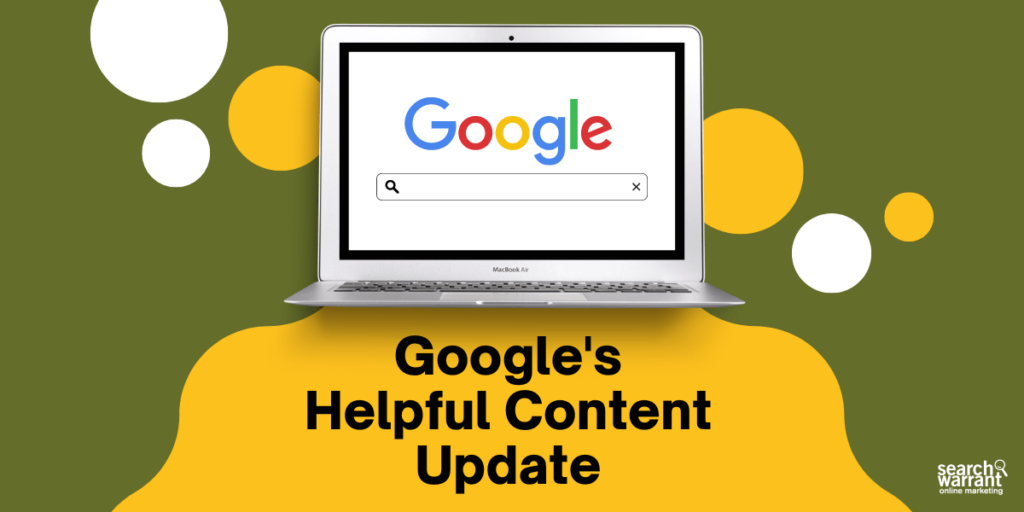Is your content unhelpful? Repent! A new Google algorithm is at hand

Authentic web masters and publishers rejoice! Aggregators and rank chasers, beware: there’s a new Google algorithm in town, it’s the Helpful Content Update…
What is the Helpful Content Update?
As you may intuit from the name, Google just published an update to its organic search algorithm that aims to promote the kind of web content humans actually find helpful and which inversely fails to promote the kind of noise that is developed, aggregated and published just to win search ranks and traffic.
TL;Dr
No time for my pithy prose? Andrew Holland does a bang up job of summarizing it here and accessories it with some cagey imagery of Drake to boot.
Are you sure this is news?
That is a fair question! For years, avid readers of this blog and followers of Google and the SEO industry in general will recognize many voices – including ours – have said,”Build a good site for your visitors – on all devices – and Google will reward you. Good usability is good SEO too.” So from that perspective, neither this update, nor the guidance issued by Google on how to operate in this ‘new environment’ is earth shattering news.
On the flip side, anyone who has visited Amsterdam knows there is a difference between having a law on the books and choosing to police and enforce it for reals. This algorithm update increases the enforcement of the ‘helpful content’ philosophy.
Ironic SEO alert
Key guidance Google has shared previously and now reiterates is that if you’re just summarizing or republishing the work of others on your site, you may not enjoy what this update does to your search ranks. So naturally, as an SEO shop ourselves, we’re sharing a couple of already published tid bits on this topic that we think are particularly useful. If no one reads this we’ll know we repurposed too much existing content. Since you’re reading this maybe it’s OK.
Helpful Content Guidance from Google
We grabbed this list of “do’s” and “don’ts” from Glen Gabe’s excellent article on the topic and Glen in turn refers to the original source from the hive mind itself.
Can you and your content respond with a “yes”?
According to Google, if you answer “yes” to the following questions, then you’re probably on the right track with using a people-first approach to content creation:
- Do you have an existing or intended audience for your business or site that would find the content useful if they came directly to you?
- Does your content clearly demonstrate first-hand expertise and a depth of knowledge (for example, expertise that comes from having actually used a product or service, or visiting a place)?
- Does your site have a primary purpose or focus?
- After reading your content, will someone leave feeling they’ve learned enough about a topic to help achieve their goal?
- Will someone reading your content leave feeling like they’ve had a satisfying experience?
- Are you keeping in mind our guidance for core updates and for product reviews?
Inversely, saying “yes” to these questions is….not good
To help you spot and avoid your own ‘less than helpful’ content, Google suggests you do not want to answer in the affirmative to any or all of these questions:
- Is the content primarily to attract people from search engines, rather than made for humans?
- Are you producing lots of content on different topics in hopes that some of it might perform well in search results?
- Are you using extensive automation to produce content on many topics?
- Are you mainly summarizing what others have to say without adding much value?
- Are you writing about things simply because they seem trendy and not because you’d write about them otherwise for your existing audience?
- Does your content leave readers feeling like they need to search again to get better information from other sources?
- Are you writing to a particular word count because you’ve heard or read that Google has a preferred word count? (No, we don’t).
- Did you decide to enter some niche topic area without any real expertise, but instead mainly because you thought you’d get search traffic?
- Does your content promise to answer a question that actually has no answer, such as suggesting there’s a release date for a product, movie, or TV show when one isn’t confirmed?
So what should you do about it?
Ideally, you double down on your already squeaky clean approach to web content. You remain expert in what you know or do — and not in every other topic — and you continue to know exactly who your audience is and how your expertise helps its members get through their day.
If you already have a specific service or product, this should be easy. Where you may be concerned is if you use content to drive all kinds of unrelated traffic to your product or service pages. Similarly, if you’re a web-based ‘middle man’, living on the arbitrage of ranks, eye balls, and traffic going hither and yon without adding any particular value yourself, the new Google sheriff may run you out of town.
To our intelligent and attractive clients — good content actors all — we’ll continue focusing on content that marries your audience’s needs with your business goals and wait semi-patiently to be rewarded.
For others who are feeling anxious at the moment, I share what I believe to be a Chinese proverb first related to me by John Blackmore, “The best time to plant a tree was 20 years ago. The second best time is today.” The Search Warrant team has its trowel at the ready.
